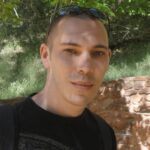Nuclear dynamics and repetitive DNA
in tissue homeostasis

We are interested in understanding the dynamic nature of the nuclear compartment and of its genomic content in somatic cell types,
during normal tissue function and upon aging.
Our questions
Repetitive DNA in tissue homeostasis
Life-long tissue homeostasis requires maintained function of differentiated cell types as well as progenitor cells, which ensure tissue self-renewal. Decades of work, have focused on how changes in gene expression, due to genetic mutation or epigenetic regulation, can result in loss of tissue homeostasis and contribute to pathologies. However, protein coding genes constitute only a small percentage of the genetic material of most eukaryotic genomes. In contrast, non-genic, repetitive DNA sequences are ubiquitous.
What are the dynamics and functions of repetitive DNA sequences in diverse somatic cell-types and tissues?
Transposable elements
Transposable elements (TEs) are omnipresent, self-propagating DNA sequences. The impact of TEs on the soma is an active area of research. Although most TE sequences remain silenced in somatic cells, some are actively transcribed and a fraction may retain their ability to mobilize through copy-and-paste mechanisms.
Our current projects aim to better understand:
- How are TEs, or other repetitive DNA sequences, controlled in somatic cell types?
- What is the impact of repetitive DNA on cell function in vivo?
- What are the long-term consequences of DNA repeat activity at a tissue and organism level?
Approaches
To study the intriguing relationship between selfish genetic elements and somatic tissue function in vivo, we are combing developmental and cell biology approaches, with genomics. We are using the fruit fly, Drosophila melanogaster, as a model system. This small, short-lived animal with a multitude of genetic tools available, is at the frontline of biological research since decades.
We are interested in different somatic cell types, but our primary focus is on the fly intestinal tissue (midgut). The fly midgut, similarly to the human intestine, is a self-renewing epithelium, maintained by a population of multipotent stem cells. Apart from its digestive functions, the tissue is critical for immune and stress responses, and organism longevity.
We have recently uncovered prevalent, tissue-specific TE mobility occurring in the Drosophila intestine, leading to gene inactivation and formation of gut tumors.
Our projects combine approaches such as:
- genetics (“classic” and CRISPR-based),
- genomics (next generation short- and long-read sequencing)
- computational biology
- imaging techniques
- longevity studies

team
Fabienne CHALVET

Assistant Professor
Sophie NETTER

Assistant Professor
Mickäel POIDEVIN

Engineer
Louis BAROLLE

Master Intern
Maxence de TAFFIN

Post Doctoral Researcher
Darshika SINGH

Post Doctoral Researcher
External funding

ERC Starting Grant
(2023-2027)

ATIP-Avenir
(2023-2026)
Latest publications
2023
Van den Beek M, Rubanova N, Siudeja K. Experimental Approaches to Study Somatic Transposition in Drosophila Using Whole-Genome DNA Sequencing. Methods Mol Biol. 2023;2607:311-327.
2021
Siudeja K*§, van den Beek M*, Riddiford N, Boumard B, Wurmser A, Stefanutti M, Lameiras S, Bardin AJ§. Unravelling the features of somatic transposition in the Drosophila intestine. The EMBO Journal. 26 févr 2021;n/a(n/a):e106388.
(*) First co-autorship; (§) Corresponding co-autorship
Riddiford N, Siudeja K, Beek M van den, Boumard B, Bardin AJ. Evolution and genomic signatures of spontaneous somatic mutation in Drosophila intestinal stem cells. Genome Res. 24 juin 2021;gr.268441.120.
2015
Siudeja K, Nassari S, Gervais L, Skorski P, Lameiras S, Stolfa D, Zande M, Bernard V, Rio Frio T, Bardin AJ. Frequent Somatic Mutation in Adult Intestinal Stem Cells Drives Neoplasia and Genetic Mosaicism during Aging. Cell Stem Cell. 3 déc 2015;17(6):663‑74.
Gogendeau D, Siudeja K, Gambarotto D, Pennetier C, Bardin AJ, Basto R. Aneuploidy causes premature differentiation of neural and intestinal stem cells. Nature Communications. 17 nov 2015;6:8894.


